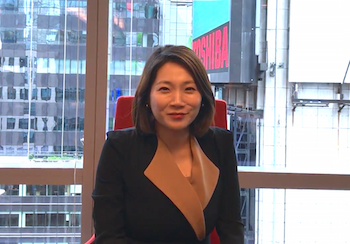
“People say ignorance gives you courage. That’s actually how I charged at new challenges. Although 80 to 90 percent of the journalism industry is consisted of white middle-aged men, it’s your capacity that defines everything at the end of the day.”
Angela Moon’s office overlooks the famous New Year’s countdown screen in Time Square. Here, she works as the first and the only Korean reporter in the New York headquarters of Thomson Reuters, one of the top three news organizations in the world.
She studied in University of Toronto and worked at the student newspaper, The Varsity. Moon briefly interned in United Nations before admitting that her true passion unwaveringly lied in journalism. She moved to Korea and worked in Yonhap News Agency and Thomson Reuters Korea where she gained recognition for numerous exclusive interviews such as with Warren Buffet and the then first lady of the U.S., Laura Bush.
“Challenge has no price,” Moon said. “Many get cold feet before even trying something new, but there are more opportunities than one may think. People said I was over myself when I shared ambitions of a position in the New York headquarters. But the thing is, I had nothing to lose.”
After a year of résumés, applications, tests, and online interviews, Moon successfully got accepted to fill in the single opening in the Wall Street team in New York.
“The stock traders in Wall Street are tough,” Moon recalled. “I needed to get through them to make my own sources, but people would only spare time if you have useful information to exchange. So nobody met me at first since I had none, but I needed my sources to acquire information to share in the first place.”
She managed her Mobius strip dilemma by simply pushing through.
“I got to work at 4 in the morning to study as much as possible as a Wall Street team correspondent,” she said. “After 4 p.m. when stock closed up, I headed to bars where stock traders usually gather to hang out. I went there every day, introduced myself to anyone and ask them to teach me anything useful. When you show people how hardworking you are, they start acknowledging you as ‘our person.’ That’s how I expanded my sources from scratch and started writing exclusive articles.”
After five years of working as a senior correspondent in the team, the company sent her to Columbia University for an MBA course to further support her potential. A year later, she was given a week to prepare a proposal of new ideas derived from advanced perspectives.
“I realized I wanted to change the newsroom,” Moon said. “Up until then, reporters didn’t want to cover social media because it was an unfamiliar subject – reporters are stubborn groups of people. In the end I managed to convince the desk, and Thomson Reuters became the first among major Press Companies to establish a Social Media Reporting Team in 2015. I have since been working as its team leader.”
At the time when the team was founded, social media’s influence had expanded to the extent where the 2016 US presidential election was called the “social media election.” Moon’s timing was thereby right on, as social media exploded daily with its users sharing their political views.
“I was virtually in charge of the ‘election team,’” Moon added. “Even after the election, Trump is using Twitter so much that it has become impossible to exclude social media when discussing political issues. In New York, news networks like AP, Bloomberg, CNN are all trying to expand its coverage in social media.”
To the youth aspiring to become international journalists, Moon noted the necessity of innovation.
“Within the journalism ecosystem, New York City is usually five years ahead of press in other countries, which means the changes we see here today is likely to emerge in Korea by the time current college students enter the society,” she said. “When I was in college, people told me to think outside the box. In your generation, why not try to think like there is no box to begin with.”
Moon further emphasized to look for a good mentor that you can look up to.
“It’s crucial to have that one person who you’d want to resemble in 5 years, 10 years,” she added. “When I was just a reporter in Reuters, there was a female editor, and I used to think of how much I wanted to become like her. Turns out, I’m follwing a similar path. You may suffer opportunity costs in other fields but having that one mentor you can look up to is pivotal.”

